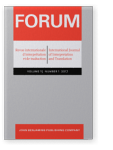Article published In:
FORUMVol. 15:1 (2017) ► pp.67–84
The idea of faithfulness and reformulation of the Gricean maxims for the needs of translation
Translation scholars have been applying the Gricean maxims as analytical tools to handle pragmatic issues in translation. Not always this genuine application is successful regarding that the maxims are culture-bound in nature and may not have the same utility in a different culture and/or in translation. Rarely any attempts have been done to adjust these maxims to the needs of translation. The present article, while does not intend to criticize the basic applicability of the maxims in translation, aims at reformulating them, within a framework of faithfulness, to be more flexible and responsive to the needs of translation. To illustrate this and evaluate the maxims, examples are analyzed and re-analyzed.
Article outline
- 1.Introduction
- 2.The Gricean maxims in translation
- 2.1The Gricean maxims
- 2.2(Non)-applicability of the Gricean maxims in translation
- 2.3A post-Gricean replacement
- 3.Theoretical framework
- 3.1Gutts’ application of the idea of faithfulness (from relevance theory) in translation
- 3.2Clark’s cooperative Common Ground Theory
- 3.3The rationale
- 4.Reformulating the maxims
- 5.Testing the reformulated maxims
- 6.Conclusion
- Notes
-
References
This article is currently available as a sample article.
References
Aghbar, Ali
1995 “
Grice’s maxims as applied to the translation of fiction.” In
Studies in the Humanities, 22 (1–2), 76–85.

Alves, Fabio and Goncales, Jose Luis V. R.
Alves, Fabio
2007 “
Cognitive effort and contextual effect in translation: A Relevance-theoretic Approach.” In
Journal of Translation Studies, 10 (1), 57–76.

Baker, Mona
1998 Routledge Encyclopedia of Translation Studies. London/New York: Routledge.


Baker, Mona
1992 In
Other Words: A Coursebook on Translation. London/New York: Routledge.


Beckett, Samuel
1956 Dar entezar-e Godo [orig. Waiting for Godot]. Translated by
Mustafa Abedini Fard. New York: Chelsea House.

Blum-Kulka, Shoshana
1981 “
The study of translation in view of new developments in discourse analysis: Indirect speech acts.” In
Poetics Today, 2 (4), 89–95.


Blum-Kulka, Shoshana, House, Julian, and Kasper, Gabriele
1989 Cross-cultural Pragmatics: Requests and Apologies. Ablex: Norwood, NJ.

Chapman, Siobhan
2011 Pragmatics. New York: Palgrave McMillan.


Clark, Herbert
1996 Uses of Language. Cambridge: Cambridge University Press.


Dynel, Marta
2009 “
Where cooperation meets politeness: Revisiting politeness models in view of the Gricean framework.” In
Brno Studies in English, 35 (1), 23–43.

Fawcett, Peter
1997 Translation and Language: Linguistic Theories Explained. Manchester: St Jerome.

Grice, Herbert P.
1989 Studies in the Way of Words. USA: Harvard University Press.

Gutt, Ernest A.
1998 “
Pragmatic aspects of translation: Some relevance-theory observations.” In
The Pragmatics of Translation, ed. by
Leo Hickey, 41–53. Clevedon: Multilingual Matters.

Gutt, Ernest A.
1992 Relevance Theory: A Guide to Successful Communication in Translation. Dallas/New York: Summer Institute of Linguistics and United Bible Societies.

Gutt, Ernest A.
1991 Translation and Relevance: Cognition and Context. London: Blackwell.

Hadi, Atefeh
2013 “
A Critical Appraisal of Grice’s Cooperative Principle.” In
Open Journal of Modern Linguistics, 3 (1), 69–72.


Hassani Laharomi, Zahra
2013 “
Conversational implicatures in English plays and their Persian translations: A norm-governed study.” In
International Journal of Applied Linguistics & English Literature, 2 (5), 51–61.


Hatim, Basil and Mason, Ian
1997 The Translator as Communicator. London: Routledge.

Hatim, Basil and Mason, Ian
1990 Discourse and the Translator. London: Longman.

Hatim, Basil
1997 Communication Across Cultures: Translation Theory and Contrastive Text Linguistics. Exeter: University of Exeter Press.

Hatim, Basil and Munday, Jeremy
2004 Translation: An Advanced Resource Book. London: Routledge.


Margala, Miriam
2009 “
Grice in translation: The case of Hrabal.” In
Journal of Language & Translation, 10 (2), 87–128.

Machali, Rokiah
2012 “
Gricean maxims as an analytical tool in translation studies: Questions of adequacy.” In
TEFLIN Journal, 23 (1), 88–104.

Machali, Rokiah
1999 “
Shift in Discourse Perspective and the Question of Translation Equivalence.” In
JOTT (Journal of Textlinguistics and Translation), l (12), 30–46.

Neubert, Albercht and Shreve, Gregory M.
1992 Translation as Text. Kent, Ohio: Kent State University Press.

Robinson, Douglas
2003 Performative Linguistics: Speaking and Translating as Doing Things with Words. USA/Canada: Routledge.


Sanatifar, Mohammad S.
2016 “
Explication of Implicatures in the Persian Translation of Barack Obama’s Selected Speeches.” In
New Voices in Translation Studies,141, Special Conference Issue: PhD thesis abstract.

Sperber, Deirdre and Wilson, Dan
1995 Relevance: Communication and Cognition. Oxford: Blackwell.

Trosborg, Anna
ed. 2010 Pragmatics across Languages and Cultures. Berlin/New York: Mouton de Gruyter.


Venuti, Laurence
1998 The Scandals of Translation. Towards an Ethics of Difference. London: Routledge.


Verschueren, Jef and Östman, Jan-Ola
Wierzbicka, Anna
1991 Cross-cultural Pragmatics: The Semantics of Human Interaction. Berlin/New York: Mouton de Gruyter.


Wilson, Deirdre and Sperber, Dan
1988 “
Representation and relevance.” In
Mental Representations: The Interface between Language and Reality, ed. by
Ruth M. Kempson, 133–153. Cambridge: Cambridge University Press.

Cited by
Cited by 1 other publications
This list is based on CrossRef data as of 9 april 2022. Please note that it may not be complete. Sources presented here have been supplied by the respective publishers.
Any errors therein should be reported to them.
